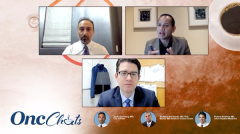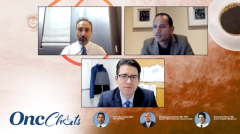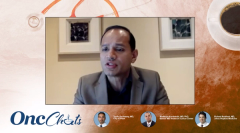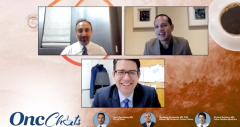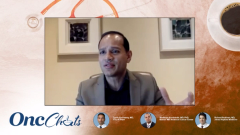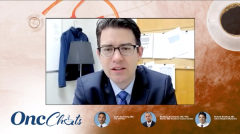
Taking Organoids From Bench to Bedside Through Endoscopy in Pancreatic Cancer: Organoid Collection
In this third episode of OncChats: Taking Organoids From Bench to Bedside Through Endoscopy in Pancreatic Cancer, Toufic A. Kachaamy, MD, Madappa Kundranda, MD, PhD, and Richard Burkhart, MD, highlight the three ways in which an organoid can be used to aid clinical sequencing and treatment selection in pancreatic cancer.
Episodes in this series

In this third episode of OncChats: Taking Organoids From Bench to Bedside Through Endoscopy in Pancreatic Cancer, Toufic A. Kachaamy, MD, of City of Hope, Madappa Kundranda, MD, PhD, of Banner MD Anderson Cancer Center, and Richard Burkhart, MD, of Johns Hopkins Medicine, highlight the three ways in which an organoid can be used to aid clinical sequencing and treatment selection in pancreatic cancer.
Kundranda: Let me just ask you a quick practical question. Patients with pancreatic cancer can’t afford to be waiting [between] 4 [and] 6 weeks to 3 months to get their next treatment or to make changes to their treatment. Would you like to comment on the time it takes to successfully get an organoid to a point wherein [we can] get an answer in terms of [predicted] response in almost a prospective fashion? Because that’s what would help patients at the end of the day, right?
Burkhart: That’s exactly right. I would say there are three ways in which an organoid can be used. The first is relatively quick; this is over the order of days to a week. In that setting, an organoid can be used to enrich the DNA that is available for clinical sequencing. When that’s done, you have the capacity to gain a better appreciation of each patient’s genetic code that’s driving their tumor. There are a variety of reasons in which this is superior or better than testing the genetic code from a tumor biopsy directly, but that’s the way that an organoid would be used in a very limited or quick setting.
The two other ways would be through pharmacotyping or drug testing. There are two general populations that would play a role here. The first is in patients who have limited disease; there’s no spread of their disease elsewhere, and they’re heading to the operating room. In that patient group, they head to the operating room and get their tumor removed. During their surgical recovery, they wind up having an organoid grown and subsequently pharmacotyped. In that patient group, their personalized drug profile is ready when they are ready to start chemotherapy in the adjuvant setting. In the second group, you have patients who are undergoing chemotherapy first as an approach to their disease management. That’s really the group in which the time to create an organoid and pharmacotype is a struggle. Right now, in my laboratory, we’ve worked that time down to about 4 to 6 weeks as a median time to pharmacotyping data. As you [said], it is not quick enough to delay or to wait for those results to start therapy.
The practical approach of it, nowadays, has been to envision a scenario where patients with metastatic disease or locally advanced disease start on a chemotherapy as they would otherwise at diagnosis. Then, as their pharmacotyping data become available, their chemotherapy is adjusted or tailored to them [based on that information].
Check back tomorrow for the next episode in the series.
Register for the upcoming Advances and Innovations in Endoscopic Oncology and Multidisciplinary Gastrointestinal Cancer Care meeting:


